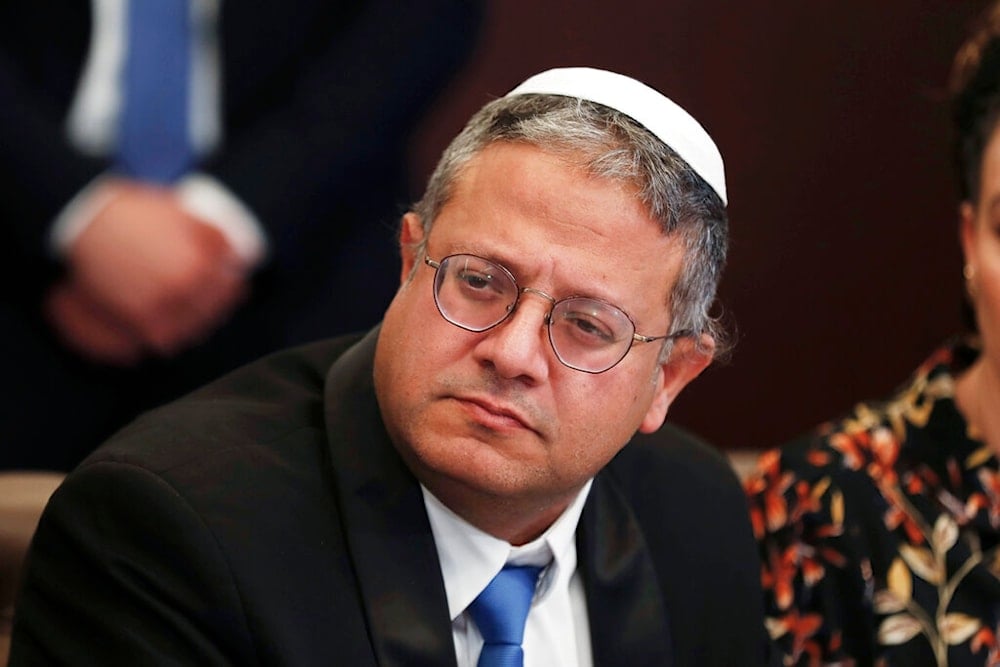Internal strife threatens Netanyahu's government amid Israeli losses
Amid significant losses in Gaza, internal divisions within Israeli occupation Prime Minister Benjamin Netanyahu's coalition are intensifying, posing a serious challenge to "Israel's" stability.
-

Itamar Ben-Gvir, the police minister in Israeli occupation PM Benjamin Netanyahu's government, attends a weekly cabinet meeting on January 3, 2023, in al-Quds, occupied Palestine. (AP)
In parallel with the significant losses suffered by "Israel" in Gaza and on all supporting fronts, differences and divisions within Prime Minister Benjamin Netanyahu's government coalition are increasing. This reveals the extent of the internal crisis that "Israel" is facing, which threatens its existence, according to Israeli media reports.
In a prominent instance of the ongoing internal division, Netanyahu once again refused yesterday, Monday, to comply with the request from Otzma Yehudit's leader and minister of police, Itamar Ben-Gvir, to join the shrunken security council. Instead, Netanyahu suggested that Ben-Gvir receive "important security updates" before they are brought to a vote in the cabinet, but Ben-Gvir declined the offer.
According to the Israeli news website Walla, Netanyahu clarified to the leader of the Jewish Power party, which holds six out of 120 seats in the Knesset, that the War Cabinet would not convene again following the withdrawal of two members, Benny Gantz and Gadi Eisenkot, from the State Camp party. Netanyahu also explored the possibility of notifying Ben-Gvir in advance of the security-political Cabinet meetings.
A source close to Netanyahu told the Israeli website Walla that "in any case, we will not include Ben-Gvir in a shrunken security council because he does not know how to keep a secret."
On June 9, Gantz and Eisenkot announced their withdrawal from the War Cabinet.
The council was subsequently dissolved, but Netanyahu continued to conduct consultations related to the conduct of the war in a smaller forum that includes Security Minister Yoav Galant, Shas Party Chairman Aryeh Deri, Minister of Strategic Affairs Ron Dermer, and National Security Council head Tzachi Hanegbi.
At the time, Ben-Gvir criticized Netanyahu, saying he "makes decisions alone and isolates his partners in the government."
Shas: Ben-Gvir's reckless behavior once again offers a prize to the opposition
In response to Ben-Gvir, Shas said it views with great gravity Ben-Gvir's reckless behavior, in a systematic and blatant violation of the coalition's obligation to vote against laws approved by the ministerial committee.
With this behavior, Ben-Gvir once again gave a prize to the opposition, which jumps at every opportunity to bring down the right-wing government.
Shas expressed deep disappointment over Netanyahu's lack of control over coalition members.
In light of this, MK Yinon Azoulay, head of the Shas bloc, ordered the Knesset members to leave the plenary session immediately, noting that Shas will meet soon, consult with its rabbis, and decide to continue on its path.
In the same context, Shas Welfare Minister Yaakov Margi attacked Ben-Gvir, saying that "with his irresponsible behavior, he will forever be remembered for causing the fall of a right-wing government during a war."
He added that "Ben-Gvir proves time and time again that he does not respect agreements and behavior as a team player," noting that he "behaves like a thug and blackmailer," describing his policy as "cheap populism that has not achieved any achievements, but rather a series of failures."
Ben-Gvir responds to Shas and attacks Deri
In response to Shas leader Aryeh Deri, Ben-Gvir's Jewish Power party said that "[Aryeh] Deri, from Oslo until today, has remained committed to the ideology of the left," noting that "Deri has always admired the left, from Rabin to Peres to Gantz, and is the main party pushing Netanyahu to adopt a policy of compromise."
"Even today, Deri opposes the inclusion of Ben-Gvir in the security forum," he continued, attributing this to differences in the conduct of the war. While Ben-Gvir insists on continuing the war to achieve "victory," Deri raises the flag of surrender and weakness, and presses for a deal, according to Ben-Gvir's party.
The Otzma Yehudit party emphasized their insistence on their demand to enter the Shrunken Security Council.
It is also important to note that on more than one occasion, Ben-Gvir and Israeli Finance Minister Bezalel Smotrich have threatened to withdraw from the government if a prisoner swap deal with the Palestinian Resistance is reached that would stop the war.
Read more: Netanyahu's new conditions could stall ceasefire talks: WashPo

 4 Min Read
4 Min Read











